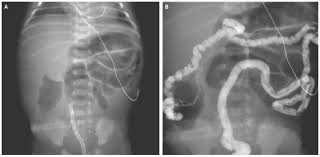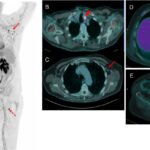Meconium ileus is a serious neonatal intestinal blockage caused by thick, sticky meconium that fails to pass through the intestines. It is often associated with cystic fibrosis (CF), with nearly 90% of affected newborns later diagnosed with CF. Early detection and treatment are essential to prevent complications such as bowel perforation and peritonitis.

Causes and Risk Factors
Meconium ileus occurs due to excessively thick meconium that obstructs the distal ileum. The primary causes and risk factors include:
- Cystic Fibrosis (CF): The most common underlying condition, CF leads to abnormal mucus secretion, affecting meconium consistency.
- Genetic Mutations: CFTR gene mutations contribute to abnormal chloride ion transport, increasing meconium viscosity.
- Premature Birth: Some premature infants may have delayed meconium passage, predisposing them to obstruction.
- Intestinal Atresia or Malformations: Congenital defects may contribute to meconium impaction.
Symptoms of Meconium Ileus
Common symptoms in newborns with meconium ileus include:
- Failure to Pass Meconium: Absence of stool within 24–48 hours post-birth.
- Abdominal Distension: Swollen, firm abdomen due to trapped meconium.
- Vomiting: Often bile-stained, indicating intestinal blockage.
- Lethargy and Poor Feeding: Discomfort leads to reduced feeding and energy levels.
Diagnosis and Medical Evaluation
Early diagnosis is crucial for prompt intervention. Diagnostic methods include:
- Prenatal Ultrasound: Detects bowel abnormalities in utero.
- X-ray Imaging: Shows soap-bubble or ground-glass appearance in the intestines.
- Contrast Enema: Helps differentiate between meconium ileus and other causes of neonatal bowel obstruction.
- Sweat Test and Genetic Testing: Confirms cystic fibrosis in suspected cases.
Treatment Options
Treatment depends on severity and complications:
Non-Surgical Management
- Enema Therapy: Hyperosmolar contrast enemas help dissolve and flush out thick meconium.
- IV Fluids and Electrolyte Correction: Supportive therapy to maintain hydration.
- Nasogastric Decompression: Reduces gastric pressure and prevents vomiting.
Surgical Intervention
- Enterotomy and Meconium Removal: When enemas fail, surgeons manually extract meconium.
- Resection and Anastomosis: In cases of bowel necrosis or perforation, affected segments are removed.
- Ileostomy: Temporary diversion of intestinal contents if extensive damage occurs.
Potential Complications
If untreated, meconium ileus may lead to severe complications:
- Intestinal Perforation: Rupture of bowel walls causing life-threatening infection.
- Meconium Peritonitis: Inflammation due to leakage of meconium into the abdominal cavity.
- Short Bowel Syndrome: If large sections of the intestine require removal.
- Recurrent Intestinal Blockages: CF-related mucus abnormalities may cause future obstructions.
Prognosis and Long-term Management
With timely treatment, the prognosis is generally good. However, infants diagnosed with cystic fibrosis require lifelong management with:
- Enzyme Supplements: Improve digestion and nutrient absorption.
- Respiratory Therapy: Prevents lung complications associated with CF.
- Regular Follow-ups: Monitor for recurrent obstructions and growth concerns.
Meconium ileus is a critical neonatal condition often linked to cystic fibrosis. Early diagnosis and intervention are key to preventing severe complications. Advances in medical imaging and surgical techniques have significantly improved outcomes for affected infants. If meconium ileus is suspected, immediate pediatric evaluation is necessary to determine the best course of action.

